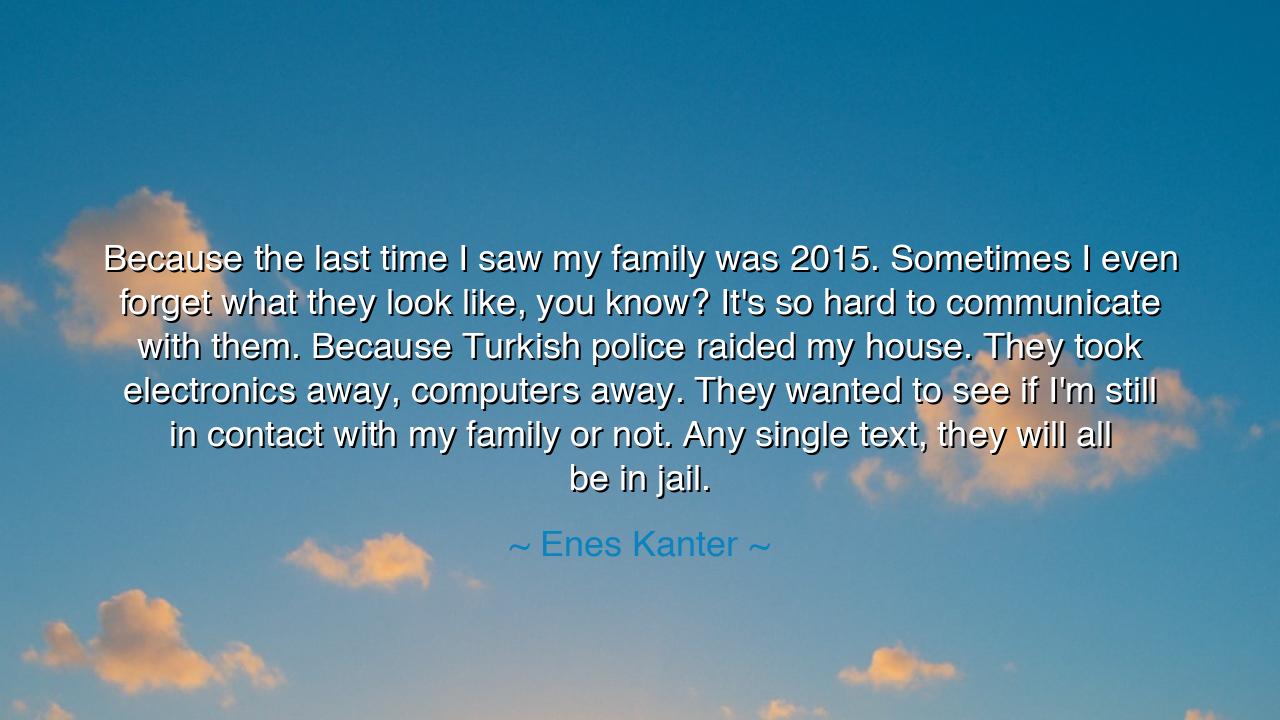
Because the last time I saw my family was 2015. Sometimes I even
Because the last time I saw my family was 2015. Sometimes I even forget what they look like, you know? It's so hard to communicate with them. Because Turkish police raided my house. They took electronics away, computers away. They wanted to see if I'm still in contact with my family or not. Any single text, they will all be in jail.






“Because the last time I saw my family was 2015. Sometimes I even forget what they look like, you know? It's so hard to communicate with them. Because Turkish police raided my house. They took electronics away, computers away. They wanted to see if I'm still in contact with my family or not. Any single text, they will all be in jail.” – Enes Kanter
In this heartrending confession, Enes Kanter, a man of courage and conviction, reveals not only his personal suffering but the heavy price of freedom in a world shadowed by tyranny. His words are not merely the lament of a son torn from his family—they are the echo of countless voices throughout history who have been silenced for daring to speak truth. Each phrase trembles with the weight of longing and exile: “Sometimes I even forget what they look like.” These are not the words of forgetfulness, but of grief so deep it numbs memory itself. Through this pain, Kanter teaches the sacred cost of standing for conscience when power demands obedience.
The origin of this quote lies in Kanter’s life as an outspoken critic of the Turkish government under President Recep Tayyip Erdoğan. Once celebrated as a national hero on the basketball court, he became an outcast when he began to speak against oppression, censorship, and the destruction of liberty in his homeland. His citizenship was revoked; his name, once cheered by crowds, was branded a crime. Yet, even as his homeland turned against him, he refused to renounce his truth. And so he stands as a figure of moral exile, separated from his family by more than distance—by the invisible chains of political persecution.
Throughout history, there have been those who have faced this same cruel separation. Consider Socrates, condemned by his city for questioning false authority. Consider Nelson Mandela, imprisoned for twenty-seven years, unable to hold his children as they grew. And remember the ancient prophets, who were cast out for declaring what others feared to hear. Like them, Kanter walks a path few would choose, but many revere: the path where integrity triumphs over comfort, and truth over safety. His story reminds us that freedom is not a gift—it is a fire, and those who carry it often burn.
When Kanter says, “They took electronics away, computers away. They wanted to see if I’m still in contact with my family,” his words become an indictment of a system that fears even a whisper of love. For what regime, if righteous, would imprison a mother for speaking to her son? What authority, if just, would fear a text message between kin? In his suffering, the corruption of oppression is laid bare: when power grows insecure, it seeks not only to silence dissent but to erase the bonds of the human heart.
And yet, within his pain, there is something radiant—the endurance of the human spirit. Though denied the sight of his family, though stripped of his home, Kanter remains unbroken. His memory of them, however faint, becomes sacred—an emblem of what cannot be conquered. For while tyranny can seize property, strip citizenship, and imprison flesh, it cannot chain the soul that remembers love. In this truth lies the essence of human dignity: that no wall, no law, no surveillance can erase the light that lives in a free heart.
There is also a deeper lesson here, one for all who live in comfort and forget the fragile nature of liberty. Kanter’s pain should awaken gratitude and vigilance within us. The freedom of speech, the right to family, the ability to communicate without fear—these are not luxuries; they are the foundation stones of civilization. We must cherish them, protect them, and raise our voices for those who have been forced into silence. For as history teaches, the silence of one man’s suffering becomes the shadow that falls upon all.
So let this story be passed down as both warning and inspiration. Beware any power that fears words, for it is already corrupt. Defend the rights of those who are silenced, for their struggle preserves your own. And if ever you must stand alone for what is right—as Enes Kanter did—remember that the pain of isolation is but the proof of your courage. The love that you fight for, though distant, is not lost; it endures beyond borders and years. For though tyranny may divide families, freedom unites souls, and in that unity, the human spirit remains invincible.
Thus, in Kanter’s sorrow, we find our reminder: truth demands sacrifice, and freedom demands remembrance. Let us not forget the faces we cannot see, nor the voices we cannot hear. For every exile, every silenced heart, is a call to all who still can speak—to use their liberty wisely, bravely, and in defense of those who have lost it.






AAdministratorAdministrator
Welcome, honored guests. Please leave a comment, we will respond soon